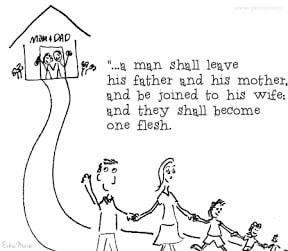A couple weeks ago, I posed a question asking how you deal with “Relativistic Parenting“?
I asked, “what DO you do in those moments when you and your family find yourselves in an uncomfortable situation which you do not agree with and would prefer to protect your kids from? Especially when this happens with family or people you otherwise like hanging out with? How do you politely bow out while also making it clear – to your kids mostly – that cannibalism {insert your own example here} is not OK without sounding like the morality police? And, how can we raise smart and confident kids who can make good and healthy decisions without creating self-righteous little monsters at the same time?”
Since then I’ve been thinking about how I’d answer that myself and it’s tricky.
On the one hand, I want to be polite and not do anything to rock the boat with friends and family. I’m allergic to conflict – I get all sweaty, start breaking out in hives, and my throat starts closing in on itself whenever I feel a disagreement coming on. Therefore, I usually avoid it at all costs. I remember when my husband and I were going through marriage prep and this was one of the areas I needed to improve on. I didn’t understand why at the time – wasn’t it a good thing to keep the boat steady? Fr. B gently explained that sometimes – many times actually – the waters will get stormy and the boat will rock. And covering my ears and eyes and singing “la-la-la-la-la” will not stop the waves from coming. Ignoring it will make the boat SINK.My naive peace-loving hippy go lucky self would rather believe there’s a way to avoid conflict forever. But, like Fr. B helped me begin to understand & accept:
There WILL BE conflict in life.
I could smile and nod my whole life, say, “yes, please”, and “no, thank you” but sooner or later someone would disagree with the way I smiled or take issue with how polite I always was. ![]() And at some point, I would end up doing or saying something that agreed with one person while disagreeing with the other. Saying “Yes” to one thing always means there is something you are saying “no” to.
And at some point, I would end up doing or saying something that agreed with one person while disagreeing with the other. Saying “Yes” to one thing always means there is something you are saying “no” to.
That might seem obvious but it seems like I, and many others, easily get caught in this “relativism” trap often – we want to say yes to everything and everyone. Can’t everyone just be happy get along all the time?!
No, we can’t. As my wise husband reminded me, even Jesus, the great peacemaker, said there will be divisions. Especially in parenthood and family life. As parents, it’s our job to say NO. It’s also our job to point our kids in the right direction and say Yes to what is right, but the majority of our job is in steering them away from the bad so they can see and choose the good in life.
From the moment we first know our child, we instinctively want to keep them safe. Once they are with us, we freak out. Suddenly, we are in charge of keeping this innocent human being alive – and maybe even happy. This instinct drives us to read, research, talk to other “experts” and experienced parents so we can do whatever we can to keep them safe, healthy, and maybe happy. In this process, we collect all sorts of advice and information, chew on it for a while, let it digest, maybe even do some real-life experimenting and see what works and what doesn’t.
Over time, and by accepting our weaknesses so to learn from our mistakes, we develop confidence. Confident parents are different than arrogant and smug parents. Confident parents know that they are not experts – they are learning and growing as they go – and they accept that humbly. Confident parents know that their first and most important priority is doing what’s best for their own family. This doesn’t mean they think their kids or their family are better than their relatives’ or friends’ kids. (Unless they do start thinking and feeling that way – then they are confidently smug parents.) ![]()
Confidence helps make parenting decisions a little easier because you know you are doing – or at least trying to do - what is good for your child and family first. In this way, you won’t spend as much time worrying about what others think about what you do and you also don’t spend as much time thinking about and judging others’ decisions because you’re secure enough in your parenting that you don’t need to. With humble confidence, making parenting decisions is about doing what’s right instead of trying to be better than others; it’s about what’s safe and healthy and ethical for your family first.
However, this kind of brings us back to the “parenting relativism” conundrum “What if something really is wrong for everyone, not just for our family. What do you say/do if you get stuck in an awkward situation?
While there’s no scripted answer, here are a few ‘tips’ I’ve come up with for myself and to share with those who may find them helpful:
1. Be Humble. Humility is an integral part of becoming a confident parent. Recognize, as a parent and a person, that you are only human. Yes, you are confident and comfortable with how you parent but this doesn’t mean you have to be smug or all “I’m the best parent in the universe and my family is better than yours, nee-ner-neer-ner-neer-ner” about it.
2. Be Charitable. A parent who is both confident and humble in their parenting shares helpful information and encourages other parents out of LOVE (Charity), not out of spite. So if you see a parent struggling or letting their kids do something you consider harmful, gently and with humble LOVE, speak up if it’s really necessary. If your child is the victim, that same humble love will lead you to lovingly either remove your child from the harmful situation or speak up in defense of your child.
3. Use the appropriate Tone. It’s amazing the variety of reactions one statement or request can cause depending on its tone. (Which is sometimes why it’s best to talk about it disagreements and misunderstandings in person or over the phone vs. through the written word.) I’ll add word choice into that also. One extra and unnecessary expletive or derogatory remark has the power to tip the scale of a conversation and send everyone down a horrible black hole where nothing good comes out. (Actually, nothing ever comes out of black holes at all.)

4. Never blame, accuse, or intentionally insult. When you find yourself in an awkward situation, don’t dig a deeper hold by bringing up things that don’t really belong in the situation you are currently in. Unless you absolutely have to. And even then, it doesn’t have to get nasty. Some people – especially those who are deeply insecure of themselves and their parenting – may end up taking offense to anything you say no matter how nicely you say it. But at least, on your part, you’ve done what is right for your family and you’ve tried to address the issue as charitably as you could without backing down. Hold your ground in one hand while your other hand offers some chocolate. ![]()
5. Don’t use your kid as a scapegoat. Unless your child really is allergic or has a real issue with the activity/food in question it’s best not to make up stories or unnecessarily make your child seem like a weakling – your child will not appreciate this as he grows up.
“Johnny is allergic to purple dinosaurs.”
6. Be honest {with tact}. If you don’t want little Suzie Q to watch a certain TV or movie program or play a certain game (or any of that at all), because it will give her bad dreams or a headache or make her start punching people all the time – say that! Kindly – but with confidence – ask if there is something different to watch or play. Or, better yet, bring your own pre-approved movies or games if you know you’ll be somewhere for an extended amount of time where there might be shows/games going on you’d rather your kids not participate in. Or, if that would create too much of a scene or if you’re dealing with some highly sensitive relatives/friends it might be time to come up with a good (and honest) reason to go to a different room, out for a walk/drive, or back home. People may scoff at you for doing these things – maybe even call you an overbearing parent – but who cares? YOU are the Parent and these children God has given you are YOUR responsibility. (Plus, you’re the one who will have to deal with them and their nightmares or upset tummies at the end of the day.)
7. Let Go.
As part of the journey I’m on from being an ugly Smug Mom to a humble Confident Mom, I’m learning that, sometimes, it’s ok to - LET THINGS GO.
There are some things I’ve become more relaxed with, some things I’ve learned to make exceptions for given the situation, and some things I’ve completely changed my mind on. (And which I change my mind about again depending on how many children are screaming at me or how much sleep I have/haven’t had.)

“I’m sick. Go play.”
“Can we watch movies and eat junk all day?”
“Yes. Now go away…please.”
The other part of letting go – maybe the hardest – is when you have to decide to let go of spending as much time or time at all with certain relatives or friends that just are not a good influence or who do not provide a healthy environment for your impressionable children. Sometimes it’s easy when this happens naturally over time when you don’t have as much in common anymore. Other times, if all the talking has been talked and there’s still no change or respect – it’s time to cut ties, at least for now. And this is brutal – for everyone involved. But, as a confident parent who puts their family’s needs first – it’s part of the deal and it happens. Maybe, in time as as the younger kids get older, it will be easier to hang out again. But if it has to happen now – Let Go. And pray for one another.
Parenting is beautiful and joyful. It’s also the hardest work…ever. There are a gazillion and one ways to parent because we are all…unique. ![]() And because of our differences, there will be disagreements, conflict, and maybe a little smugness from time to time. It’s part of life – it’s part of parenting & family life. I think accepting the fact thatconflict does and will exist makes it easier for parents and their children to prepare for and deal with the awkward social interactions that naturally arise from our diversity. That, and remembering that after it’s all said and done, all parents are pretty much winging it – loving our kids and flying by the seat of our pants hoping we don’t crash or cause too much long-term damage to our kids in the process.
And because of our differences, there will be disagreements, conflict, and maybe a little smugness from time to time. It’s part of life – it’s part of parenting & family life. I think accepting the fact thatconflict does and will exist makes it easier for parents and their children to prepare for and deal with the awkward social interactions that naturally arise from our diversity. That, and remembering that after it’s all said and done, all parents are pretty much winging it – loving our kids and flying by the seat of our pants hoping we don’t crash or cause too much long-term damage to our kids in the process.
Copyright 2013 Erika Marie
About the Author

Erika Marie
Erika Marie is a simple Catholic, Wife, and Mama. She relishes snuggles and free time with her family and enjoys reading, writing, blogging, and has a slightly obsessive addiction to creating Canva graphics. Enjoy more reflections by Erika at her personal simplemama blog.






.png?width=1806&height=731&name=CatholicMom_hcfm_logo1_pos_871c_2728c%20(002).png)
Comments